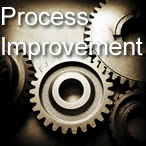Sales Managers are Reporting Regulators
Sales managers are a pivot-point for reporting within an organisation.
Accurate, relevant, simple reports built around appropriate data enable sales managers to know what has happened, what needs to happen and what’s likely to happen if an individual or team maintains the status quo. Running your sales team without effective sales reporting is like riding a motorbike blindfolded.
If you can’t measure it you can’t manage it
And just as importantly, as a sales manager you need to be reporting inwards to assist leadership in making decisions and setting priorities. Reports from sales should be providing marketing with the intelligence required to develop appropriate market-engagement plans and content and R&D should be guided by what sales are hearing from the market to guide or confirm development decisions.
One of the challenges I faced in sales management was ensuring the reporting demanded of me, and that I asked from my team, was really necessary and added value to the business. All too often I found management requesting reports that were difficult to justify, time-consuming to produce and added little or no value to the productivity of the business, or my sales team. Likewise, a sales manager needs to ensure the reports that he requires from his team provide measures that help both the sales manager, the team and the individuals achieve their goals. Reporting on appropriate metrics should help identify areas for improvement, not catch people out.
Read more →




